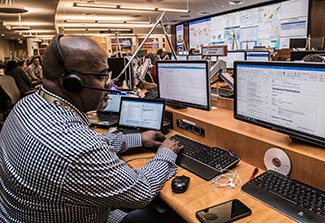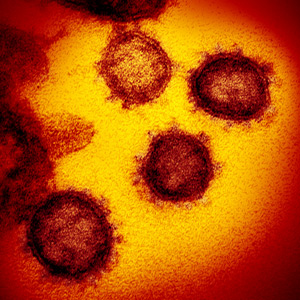NIH mobilizes research to address new coronavirus
January / February 2020 | Volume 19, Number 1
The coronavirus outbreak that began in China in late 2019 has focused the world’s attention on how best to slow transmission, diagnose and treat those with the illness, named COVID-19.

Photo by James Gathany/CDC
U.S. government scientists are assisting in the global
response to the coronavirus outbreak, and are studying
potential vaccines and treatments.
The WHO recently convened more than 300 scientists to help coordinate the research agenda. “I was very encouraged to see the energy and speed with which the global research community has taken up this challenge,” said WHO Director-General Dr. Tedros Adhanom Ghebreyesus. Scientists are already addressing the most pressing issues such as creating quick and inexpensive diagnostics, discovering the best approaches for prevention, studying effectiveness of potential therapies and accelerating development of existing vaccine candidates, he said. In addition, researchers are trying to identify the source of the virus and prevent further transmission from animals to humans.
At NIH, scientists have been working since early January to develop a coronavirus vaccine and hope to have it ready for initial testing soon. “We are proceeding as if we will have to deploy a vaccine,” said Dr. Anthony S. Fauci, director of the National Institute of Allergy and Infectious Diseases (NIAID). “We’re looking at the worst scenario if this becomes a bigger outbreak.”

Courtesy of NIAID-RML
A transmission electron microscope image shows
SARS-CoV-2, the virus that causes COVID-19.
NIAID is also investigating existing therapeutics that might help save lives immediately. For instance, the experimental antiviral remdesivir successfully prevented another type of coronavirus disease in rhesus macaques being studied by a scientific team at NIAID’s Rocky Mountain Laboratories. Several clinical studies of the drug are now underway in China. Meanwhile, researchers in Thailand reported seeing improvement in several patients treated with HIV drugs lopinavir and ritonavir, in combination with the flu drug oseltamivir.
To encourage coronavirus research, NIAID has issued a
funding call to current grantees whose work would benefit from a funding supplement.
At Fogarty, a team of disease modelers led by Dr. Cécile Viboud has been working around the clock to process and analyze initial publicly available data. An online community for Chinese physicians and health care professionals provides
real-time situation reports of the outbreak, including cumulative case counts, outbreak maps and real-time streaming of health authority announcements. The data provide a snapshot of patient information in terms of age, gender and symptom onset.
HHS has offered to send American experts to China to help with the response and the State Department has pledged $100 million to aid China and other countries affected by COVID-19.
Considering early lessons from the outbreak,
The Lancet editor Dr. Richard Horton encouraged policymakers to take note. “Research is sometimes seen as a luxury when countries are being urged to invest in primary health care,” Horton observed. “But the COVID-19 outbreak has shown the foundational importance of research for any effective public health response.”
More Information
To view Adobe PDF files,
download current, free accessible plug-ins from Adobe's website.